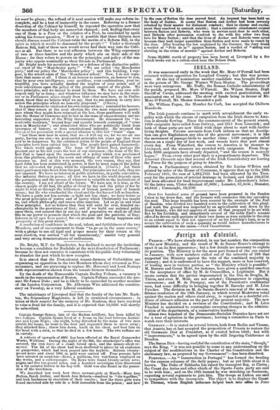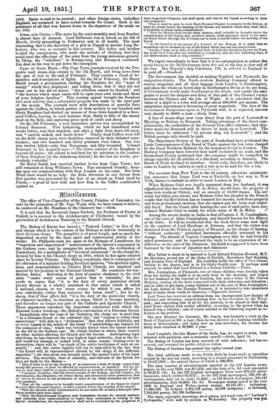lurtigt tut Culotte.
Faxtres.—We have already stated, in our last number, the composition of the new Ministry, and the result of M. de Sainte-Beuve's attempt to upset it on its first appearance ; but a few details are necessary to explain its position. The Ministry is for the most part formed of the one ousted in January, with new members culled out of the minority of 286 that supported the Ministry against the vote of the combined majority in January ; and it is understood to have the support, more or loss reserved, of leading men in various parties, as "the Ministry which is possible." M. Berryer and Count Mole, for instance have given a qualified sanction to the acceptance of office by M. de CrOuseilhes, a Legitimist. But it seems certain that the parties impersonated in the Due de Broglie, M. Thiers, and even M. Mole, are not satisfied; Changamier is expecting concessions ; and M. de Persig,ny, one of the President's confidential men, had some difficulty in bringing together M. Baroehe and M. Leon Faucher. The division on M. de Sainte-Beu.ve's renewal of the no-con- fidence resolution of the lfith January, in which several Moderates voted against the motion and others staid away, is regarded as a doubtful evi- dence of ultimate adhesion on the part of the present majority. The new Ministry has decided on a revision of the Constitution ; and M. Le'on Faucher is understood to contemplate sweeping changes in the adminis- tration of the departments, of a conservative tendency. About two hundred of the Democratic-Socialist Deputies have set out for a tour of agitation in the provinces ; leaving a committee in Paris to watch over their interests.
GERMANY.-It is stated in several letters, both from Berlin and Vienna, that Austria has at last accepted the proposition of Prussia to restore the
old Germanic Diet at Frankfort, as it existed before 1848; but with "improvements," to be agreed upon by the still lingering Conference at Dresden.
The Saxon Diet —having modified the constitution of the state, "though" says the King, "it was not possible to oonae to any understanding on the subject of the modifications in the Charter of the Constitution and the electionary law, as proposed by my Government"—laas beer:dissolved.
Porrestat.—An "Insurrection in Portugal" has formed the heading for the express columns of the daily papers ; but as yet little about it is
known. The Duke of Saldanha has raised the insurgent flag, at Cirrtra ; the Count des Antes and other chiefk of the Oporto Junta party are said to be with him; and on the 10th instant be was marching on Santarem, expecting several regiments to join him. The troops at Lisbon are said to sympathize with the insurgents. The object is to displace the Coma de Timmer, whom English influence helped back into offiee in Jhne
1849. Spain is-said to be neutral ; and other foreign states, including Fmgland, are surmised to have cooled towards the Count. Such is the substance of all that was known down to the departure of the Mails on the 10th.
INDIA kND Can.:A.—The news by the semi-monthly mail from Bombay is almost hare of interest. Lord Dalhousie was at Attack on the 8th of March, slowly proceeding to Peshawur, and in ill health. The most interesting fact is the discovery of a plot in Nepaul to murder Jung Ba- lladeer' i who was so recently n this country. His father and brother headed the conspirators, who made the mistake of thinking that they eeuld.steal the affections of the army from the young statesman-general. Itt China, the "rebellion" in Kvrang-tung and Kwang-ai continued. Lin died on his way to put down the insurgents.
CAPE OF GOOD HOPE.—The Cape Town journals received by the Pro- pontis mail steam-ship extend to the 7th March, and bring news from the seat of war to the end of February. They contain a cloud of de- spatches and descriptions of fights. On the 3d of February, Sir Harry Smith issued a proclamation chiding the Burghers for the "want of energy" which they displayed ; and telling them, that if they did not oome out to his aid en masse, "this rebellion cannot be checked," and "the horrors which must ensue will be upon your own heads and those of your helpless families." This rousing appeal brought the Burghers into such activity that a substantial progress was made in the later part of the month. The journals teem with descriptions of guerilla feats against the Caffres, in which parties of from seventy to one hundred and thirty Burghers had slashed up masses of from three hundred to a thou- sand Caffres, leaving in each instance from thirty- to fifty of the enemy dead on the field, and capturing great spoil of cattle and sheep.
On the 23d February, a very important service was accomplished by Colonel Somerset. Fort Armstrong, which we had abandoned some weeks before, was then attacked, and after a fight from dawn till noon was "carried, sacked, and burnt down." Ninety dead Caffres were loft on the field—many more were doubtless removed by their defeated coun- trymen; and two hundred and thirty prisoners were taken. Our loss was twelve killed—only four Europeans, and fifty wounded. Colonel Somerset in his despatch says—" The brave conduct of the Burghers is beyond all praise : the colony is indebted for its salvation to the conduct -of these Burghers [in the Armstrong district] for the last six weeks, par- ticularly yesterday." Sir Harry Smith had received further levies from Cape Town ; but still remained at King William's Town. Pato continued friendly, keep- ing open our communication with East London on the coast But from Natal there would be no help : the Zulu diversion in our favour from that quarter was prevented by the fear of an attack on Natal itself by Panda,— a proof of how wide and how firm is the Caffre combination -against us.



























 Previous page
Previous page